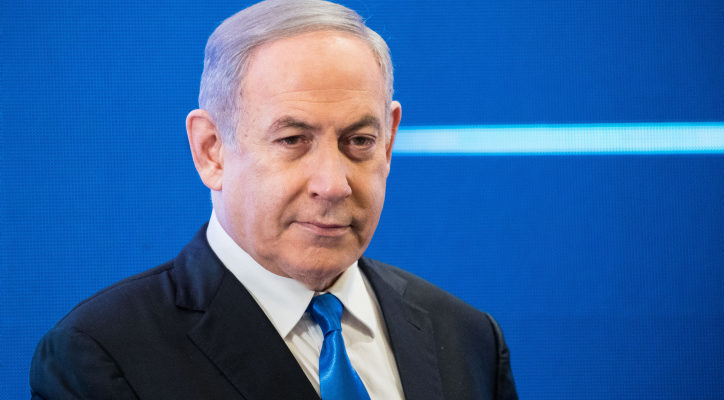
 Both the ongoing corona virus pandemic and the president’s refusal to extend the coalition deadline for Netanyahu rival Benny Gantz leave the prime minister in a stronger position.
Both the ongoing corona virus pandemic and the president’s refusal to extend the coalition deadline for Netanyahu rival Benny Gantz leave the prime minister in a stronger position.
By Associated Press
Israel’s president on Sunday rejected a request to extend coalition talks between the country’s two most powerful political parties — appearing to give a boost to Prime Minister Benjamin Netanyahu and pushing the nation toward an unprecedented fourth consecutive election in just over a year.
The decision by President Reuven Rivlin capped a stunning turnaround in fortunes of Netanyahu, who just a month ago was fighting for his political survival as he prepared to go on trial for corruption charges. His challenger, Blue and White party leader Benny Gantz, now faces an uphill struggle as he races to salvage a power-sharing deal with Netanyahu.
Rivlin last month gave Gantz the task of forming a new government, after a narrow majority of lawmakers endorsed him as prime minister in the wake of March 2 elections. With his parliamentary majority, Gantz began work on legislation that would have prevented Netanyahu from serving as prime minister in the future.
But in an abrupt about-face, Gantz accepted an invitation from Netanyahu to form a “national emergency” government to confront what was then a burgeoning coronavirus outbreak.
Gantz froze the anti-Netanyahu legislation and accepted the post of parliament speaker as he began talks on a rotation agreement in which both men would serve as prime minister. The turnabout prompted Gantz’s main partner — the secular and middle-class Yesh Atid party — to bolt, causing his Blue and White alliance to disintegrate and leaving it at less than half its original strength.
In the meantime, unity talks with Netanyahu stalled, reportedly over issues that have little to do with the pandemic. Israeli media have reported that Netanyahu insisted on pushing ahead with his plans to annex parts of Judea and Samaria and demanded more influence over judicial appointments.
Claiming he was close to a deal, Gantz on Saturday asked Rivlin, who is responsible for choosing a prime minister-designate after elections, for a two-week extension.
But on Sunday, Rivlin rejected the request, citing the “current circumstances.” He said he was giving both Gantz and Netanyahu until the original deadline, at midnight Monday, to reach a deal, and would consider giving them extra time only if both said they were close to agreement.
The looming deadline, along with the coronavirus crisis, has placed Netanyahu in a much stronger position.
Citing restrictions on large gatherings due to health concerns, Netanyahu’s hand-picked justice minister last month all but shuttered the national court system, delaying the prime minister’s corruption trial until May and perhaps longer.
While Gantz now appears desperate for a deal, Netanyahu is riding a wave of popularity thanks to his handling of the coronavirus crisis. Israel has reported nearly 11,000 cases and over 100 dead, but appears to be weathering the crisis better than most countries.
This popularity could give Netanyahu the upper hand in last-minute negotiations with Gantz, or position him well for a future election.
Late Sunday, the two rivals issued a joint statement saying they would not be giving any more media interviews “in an effort to advance negotiations toward forming a national unity government.”
If they fail, a new election isn’t guaranteed. Rivlin said he would first give the Knesset, or parliament, three weeks to endorse another candidate as prime minister.
Netanyahu is likely to use that time to try to lure members from the other side or to reach a deal with a weakened Blue and White. After recruiting a defector from the opposing camp on Sunday, he has the backing of 59 lawmakers, two short of a majority. Gantz might also try to revive the anti-Netanyahu legislation, although it was unclear if he could do so.
Without a coalition deal, the country could be headed to elections — albeit with a much stronger Netanyahu and a much weaker opposition in place.
持续的日冕病毒大流行以及总统拒绝延长内塔尼亚胡的对手本尼·甘茨的联合最后期限,都使总理处于更有利的地位。
美联社
以色列总统周日拒绝了延长该国两个最强大政党之间的联合谈判的要求,这似乎在推动总理本杰明·内塔尼亚胡(Benjamin Netanyahu),并推动该国在短短一年多的时间内连续第四次大选。
鲁文·里夫林(Reuven Rivlin)总统的决定使内塔尼亚胡的命运发生了惊人的转变。就在一个月前,内塔尼亚胡正为自己的政治生存而战,他准备接受腐败指控接受审判。他的挑战者,蓝白党领袖本尼·甘茨(Benny Gantz)在争夺与内塔尼亚胡(Netanyahu)的权力分享协议时,正面临艰苦的斗争。
在3月2日大选后,一小撮议员认可他为总理之后,上个月,里夫林就授权了甘茨组建新政府。甘茨以议会多数席位开始制定法律,以免内塔尼亚胡将来担任总理。
但是突然,甘茨接受了内塔尼亚胡的邀请,组成了一个“国家紧急状态”政府,以应对当时正在迅速发展的冠状病毒爆发。
甘茨冻结了反内塔尼亚胡的立法,并在他开始就轮换协议进行谈判时接受了议会议长的职务,轮换协议中,两人均将担任总理。转机促使甘茨的主要伙伴-世俗和中产阶级耶什·阿蒂德(Yesh Atid)狂欢,导致他的蓝白联盟解散,使它的实力还不到其原始实力的一半。
同时,据报道与内塔尼亚胡的统一谈判陷入停顿,原因是与大流行无关的问题。以色列媒体报道说,内塔尼亚胡坚持推进其吞并犹太和撒马利亚部分地区的计划,并要求对司法任命施加更大影响。
甘茨声称自己已接近达成协议,他在星期六要求里夫林(Rivlin)延长任期两周。里夫林是大选后负责选择总理的人选。
但是在周日,里夫林以“当前情况”为由拒绝了这一请求。他说,他要给甘茨和内塔尼亚胡双方直到原定的期限,即周一的午夜,以达成协议,并且只有在双方都表示同意时,才会考虑给他们额外的时间。
迫在眉睫的最后期限以及冠状病毒危机使内塔尼亚胡处于更加有利的地位。
内塔尼亚胡(Natanyahu)亲自挑选的司法部长出于对健康的担忧而限制了大型聚会,上个月几乎关闭了国家法院系统,将总理的腐败审判推迟到5月甚至更长。
甘茨现在似乎迫切希望达成协议,而内塔尼亚胡(Netanyahu)由于处理冠状病毒危机而倍受青睐。以色列报告了近11,000例病例,有100多人死亡,但似乎比大多数国家更好地度过了这场危机。
这种人气可以使内塔尼亚胡在与甘茨(Gantz)的最后一刻谈判中占据上风,或者为他将来的选举做好准备。
周日晚些时候,这两个竞争对手发表联合声明,称他们将不再接受媒体采访,“以推动建立民族团结政府的谈判。”
如果失败,则不能保证进行新的选举。里夫林说,他将首先给议会以三个星期的时间,以认可另一位候选人担任总理。
内塔尼亚胡很可能会利用这段时间来引诱另一方的成员,或与实力较弱的蓝白党达成协议。在周日从对面营地招募叛逃者后,他得到了59名议员的支持,比多数议员少了2名。甘茨还可能试图恢复反内塔尼亚胡的立法,尽管尚不清楚他是否可以这样做。
如果没有达成联盟协议,该国可能将面临选举,尽管内塔尼亚胡(Netanyahu)要强大得多,反对派却要弱得多。



 Both the ongoing corona virus pandemic and the president’s refusal to extend the coalition deadline for Netanyahu rival Benny Gantz leave the prime minister in a stronger position.
Both the ongoing corona virus pandemic and the president’s refusal to extend the coalition deadline for Netanyahu rival Benny Gantz leave the prime minister in a stronger position.